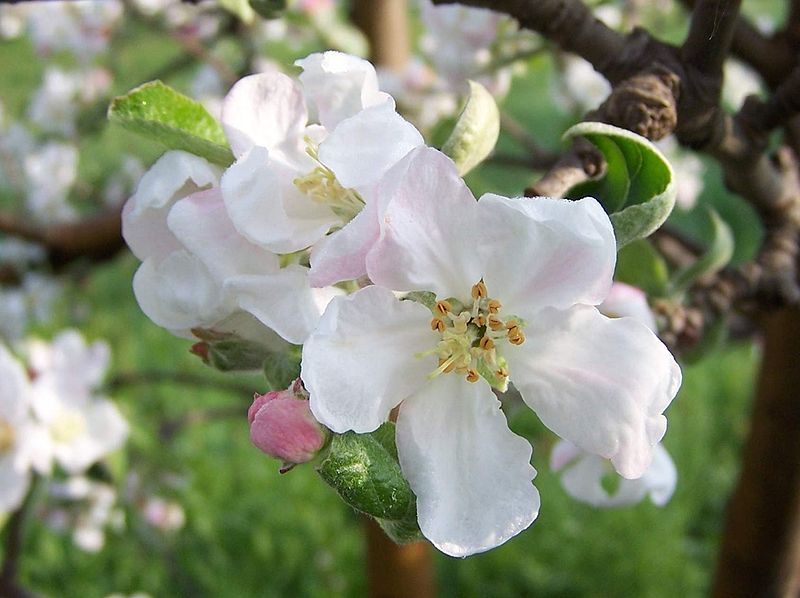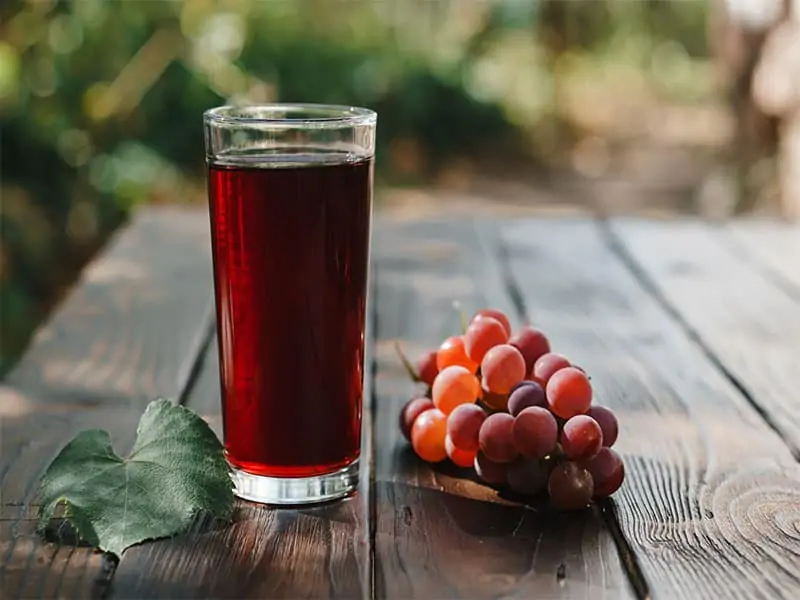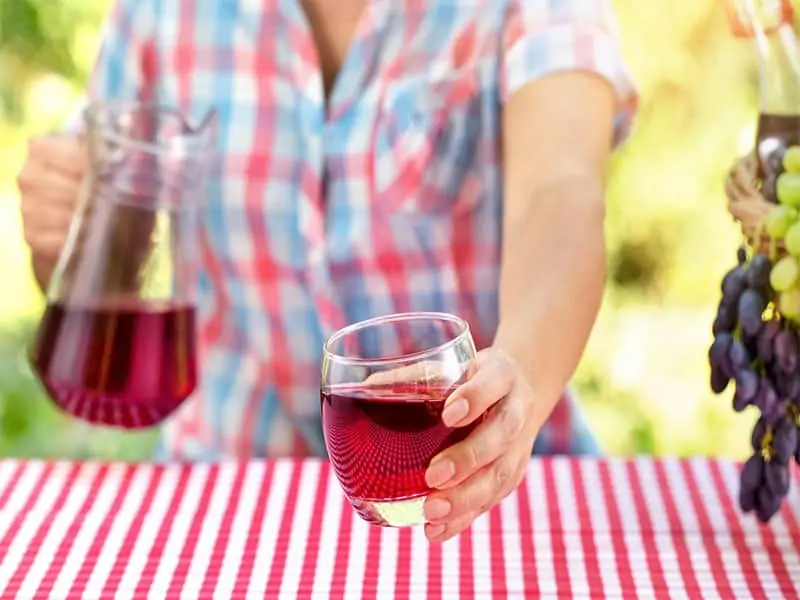Recipes
Apple Cider Vinegar Grape Juice Recipe
Table of Contents
About Apple and Apple Cider Vinegar Grape Juice Recipe
An apple is an edible fruit produced by an apple tree (Malus domestica). Apple trees are cultivated worldwide and are the most widely grown species in the genus Malus. The tree originated in Central Asia, where its wild ancestor, Malus sieversii, is still found today. Apples have been grown for thousands of years in Asia and Europe and were brought to North America by European colonists. Apples have religious and mythological significance in many cultures, including Norse, Greek, and European Christian tradition.
Apples grown from seed tend to be very different from those of the parents, and the resultant fruit frequently lack desired characteristics. Generally then, apple cultivars are propagated by clonal grafting onto rootstocks. Apple trees grown without rootstocks tend to be large and much slower to fruit after planting. Rootstocks are used to control speed of growth and the size of the resulting tree allowing for easier harvesting.
There are more than 7,500 known cultivars of apples. Different cultivars are bred for various tastes and use, including cooking, eating raw and cider production. Trees and fruit are prone to a number of fungal, bacterial and pest problems, which can be controlled by a number of organic and non-organic means. In 2010, the fruit’s genome was sequenced as part of research on disease control and selective breeding in apple production.
Worldwide production of apples in 2018 was 86 million tonnes, with China accounting for nearly half of the total.
Etymology
The word apple, formerly spelled æppel in Old English, is derived from the Proto-Germanic root *ap(a)laz, which could also mean fruit in general. This is ultimately derived from Proto-Indo-European *ab(e)l-, but the precise original meaning and the relationship between both words is uncertain.
As late as the 17th century, the word also functioned as a generic term for all fruit other than berries but including nuts—such as the 14th century Middle English word appel of paradis, meaning a banana. This use is analogous to the French language use of pomme.
Description
The apple is a deciduous tree, generally standing 2 to 4.5 m (6 to 15 ft) tall in cultivation and up to 9 m (30 ft) in the wild. When cultivated, the size, shape and branch density are determined by rootstock selection and trimming method. The leaves are alternately arranged dark green-colored simple ovals with serrated margins and slightly downy undersides. Apple blossom
Blossoms are produced in spring simultaneously with the budding of the leaves and are produced on spurs and some long shoots. The 3 to 4 cm (1 to 1+1⁄2 in) flowers are white with a pink tinge that gradually fades, five petaled, with an inflorescence consisting of a cyme with 4–6 flowers. The central flower of the inflorescence is called the “king bloom”; it opens first and can develop a larger fruit.
The fruit is a pome that matures in late summer or autumn, and cultivars exist in a wide range of sizes. Commercial growers aim to produce an apple that is 7 to 8.5 cm (2+3⁄4 to 3+1⁄4 in) in diameter, due to market preference. Some consumers, especially those in Japan, prefer a larger apple, while apples below 5.5 cm (2+1⁄4 in) are generally used for making juice and have little fresh market value.
The skin of ripe apples is generally red, yellow, green, pink, or russetted, though many bi- or tri-colored cultivars may be found. The skin may also be wholly or partly russeted i.e. rough and brown. The skin is covered in a protective layer of epicuticular wax. The exocarp (flesh) is generally pale yellowish-white, though pink or yellow exocarps also occur.

Apple cider vinegar grape juice recipes are one of the most researched things on the internet. And for good reason. Not only does the mix taste great, it’s also great for your health.
Apple cider vinegar can do wonders for your body. Yes, it is painful. However, if you use Welch’s 100% grape juice, your drink will taste very good. Moreover, there is no added sugar.
In this article, I will share with you my apple cider vinegar and juice recipe. I will also talk about 15 health benefits of drinking apple cider vinegar and grape juice, so let’s get started. (Apple Cider Vinegar Grape)
Is It OK To Mix Apple Cider Vinegar With Juice?
Yes, it’s okay to mix apple cider vinegar with juice, especially grape juice. I’ve modified the regular recipe to provide a refreshing alternative you’ll enjoy.
The drink consists of naturally sweet elements that strengthen this delicious drink. This recipe is good for you because apple cider vinegar and grape juice support heart health.
There are no rules on how to drink this concoction. Or when to drink. If you are on a weight loss journey and are maintaining a healthy weight, you can eat it before breakfast to help you consume less food.
Or you can drink it with your meal to complete your lunch or dinner. I usually take it before bed to avoid nighttime snacks. Also, the fewer ingredients the better when making healthy drinks.
And don’t worry about time. As long as you do not consume other than the amount of calories and sugar you take, you can eat this delicious mix whenever and wherever you want. You can use Welch’s 100% grape juice. (Apple Cider Vinegar Grape)
Watch this video for more information:
Or pick fresh grapes and blend them in a juicer. Avoid near mature ingredients as you will end up with a dull finish. First, soak your fresh grapes in salt water for 15 minutes to remove any dirt.
Then drain the water and gently brush the grapes while rinsing them under running water. Put the grapes in a smaller saucepan and add the water, mint leaves, honey and of course apple cider vinegar.
Let sit on medium-low heat for 10 minutes. Take it out and let the mixture cool. When done, use a blender to smooth it out. Cover a bowl with cheesecloth and pour the mixture over it. Then squeeze the juice into a glass. Use leftovers to add texture to baked goods.
Finally, fill your serving glass with ice and pour it into the water. It is recommended to consume this drink immediately. However, if you can’t drink it all at once, store the leftovers in the refrigerator for tomorrow.
Wondering if you can add alcohol to this mix? Answer Yes. Just add some vodka and enjoy. Or you can leave out the apple cider vinegar and keep it simple. It’s up to you and your preferences.
This drink can last up to three days in the refrigerator. Do not leave at room temperature for more than two hours. Otherwise, your drink will lose nutrients. Check after two days to make sure it’s not going bad.
Apple cider vinegar does not expire. However, combining it with grape juice makes the solution prone to nutrient depletion and oxidation. You can avoid this by using a good airtight container.
It is also recommended to store the beverage in a dark and cool place. Restricts exposure to heat and light, which can accelerate the decline in nutrients. You can store your beverage in the freezer for future use.
Use a freezer-safe container and leave an inch of space to allow for expansion. Apple cider vinegar and grape juice will stay good for up to 3 months. (Apple Cider Vinegar Grape)
Watch this video for more information:
Apple Cider Vinegar And Grape Juice Recipe

The apple cider vinegar and grape juice recipe is a super tasty and refreshing treat for an energy boost and appetite. The best part? It is great for your health, especially your heart health.
That said, let’s put together all the ingredients you’ll need to prepare this drink. It takes a few minutes to prepare, so don’t worry. The following recipe will provide four servings. (Apple Cider Vinegar Grape)
Ingredients:
- ¼ cup water
- 2 teaspoons honey
- 2 tablespoons apple cider vinegar
- 16 fl oz grape juice (either fresh from 40 oz grapes or store-bought juice)
- 8 leaves spearmint fresh
- 2 cups ice cubes
Instructions:
In a saucepan, add the grapes, honey, water, mint leaves and apple cider vinegar. Boil for a few minutes on medium-low heat. Remove from heat and let cool.
Add the solution to a juicer or blender and blend until smooth. Place cheesecloth over another bowl. Put the water on it. Squeeze to remove remaining liquid into bowl.
You can hide the residue to provide texture and flavor to baked goods. Or throw it. Pour your mixture into a tall glass. I usually serve this drink over ice on a hot day. (Apple Cider Vinegar Grape)
Extra tip:
Grape juice isn’t the only grape-based product that provides health benefits. Grapeseed oil is a healthier alternative to typical cooking oils. It is rich in vitamin E and omega-6 fatty acids. (Apple Cider Vinegar Grape)
What Are The Benefits Of Drinking Apple Cider Vinegar And Grapefruit Juice?

Vegetable and fruit juices have high nutritional value in a wide variety of great flavors. Many healthy juices, such as apple juice and grape juice, have phytonutrients in addition to minerals and nutrients.
This adds to their health and cholesterol-lowering benefits. Vinegar is a type of juice, a cholesterol-lowering and health-boosting beverage. And when combined with grapes, it turns into a health bomb.
Both grape juice and apple cider vinegar provide individual health benefits. And it’s always a good idea to drink them together. Now, let’s discuss some of the 15 health benefits of drinking this beverage. (Apple Cider Vinegar Grape)
1. Health Heart
Apple cider vinegar has a long history of preventing conditions that increase the risk of heart disease. In one study, ACD was proven to reduce blood lipids in individuals with hyperlipidemia. This proves that natural remedies work. Improvement is undeniable when supported by studies.
2. Weight Loss
Grape juice is rich in polyphenols such as resveratrol. This can prevent heart disease and obesity. However, the benefits of grape juice do not eliminate its side effects.
Regular drinking of grape juice and other high fructose beverages is not recommended. Have these drinks occasionally (add 3 servings per week) to prevent weight gain.
Also, if you have diabetes, please consult your doctor and learn more about grape juice. Drinking grape juice regularly can increase your blood sugar levels. (Apple Cider Vinegar Grape)
3. Fewer Calories
The usual apple cider vinegar and grape juice recipe includes honey, because honey is great at connecting flavors. It is also better than sugar as it does not raise blood sugar too much.
The best part? Perfect for people counting calories. Half a tablespoon of honey in today’s recipe limits calories and adds sweetness. It is within the dietary allowance for a 2000 calorie diet. (Apple Cider Vinegar Grape)
4. Antioxidant
According to a study published in the British Journal of Nutrition in 2011, grape juice concentrate may protect blood cells from damage from high cholesterol levels.
Laboratory animals given grape juice concentrate for 5 weeks were included in the study. This resulted in lower oxidative damage to blood cell DNA.
This study also evaluated the possible beneficial effects of juice on liver cells in a high-cholesterol diet. However, the last study did not investigate any liver-protective effects.
5. Resveratrol
As I mentioned earlier, resveratrol is a very powerful antioxidant that lowers cholesterol. It’s found in grape pulp and skin, making the juice a great source of this nutrient.
However, unlike green grapes, darker grapes known as muscadines contain more antioxidants. They are native to the Southern United States. Most juices contain these grapes.
6. Apple Juice
According to a study published in the journal Lipids in Health and Disease in 2009, apple juice may prevent the progression of atherosclerosis.
Laboratory animals were included in the study. And they consumed high-cholesterol diets supplemented with 10 mL or 5 mL of apple juice daily for 2 months.
The research showed that in both conditions, apple juice lowered triglycerides, cholesterol, inflammation, atherosclerosis, and blood clotting factors in the coronary arteries.
The higher dose decreased the low-density lipoprotein or “bad” form of cholesterol and increased the high-density lipoprotein or “good” form of cholesterol.
7. Vinegar
Studies suggest that consuming vinegar with a meal reduces the cholesterol spike that can occur after a meal. Again, one of the studies published in the journal Lipids in Health and Disease in 2010 proves that vinegar has many health benefits.
The research involved laboratory animals consuming a single dose of 10 mL or 5 mL vinegar on high-cholesterol diets. After 15 hours, they tested their blood cholesterol levels.
It caused a decrease in LDL cholesterol, apolipoprotein B, total cholesterol and oxidized LDL. Vinegar can beat cholesterol spikes after fatty meals.
8. Anti-Aging
Since this mixture is a powerful antioxidant, it is also excellent in preventing wrinkles. In addition, it can make your face and body appearance look younger than before.
9. Less Stress
Drinking apple cider vinegar and grape juice can also help reduce stress. That’s why I always have a glass of this beverage after a busy work day. It also helps to refresh the thinking process.
10. Calmness
This drink is also a great way to relax your mind. Additionally, it will help calm your mind as well. Drink a glass of apple cider vinegar and grape juice after a long work day.
11. Anxiety
The antioxidants in this beverage may help fight anxiety. Anxiety is common among young and old alike. Therefore, take the drink regularly to reduce the chances of these problems.
12. Better Metabolic Rate
This drink can also improve your metabolism. With the appearance of oxygen in the whole body, it turns meals into energy in the optimum way. Danish bread has the same health benefits as this beverage.
13. Healthy Digestive System
Drinking these types of beverages can also help your digestive system. It will help increase intestinal bowel movement and stop fat absorption. This results in a healthy digestive system, prevents digestive issues and maintains good body condition.
14. Antibacterial Properties
Another major benefit of this drink includes natural antibacterial properties that help promote a healthier body. That is, it will help prevent any possibility of virus or bacterial infection.
It will also prevent the chances of developing diseases and help in the treatment of diseases. Arnica has the same health benefits that can help prevent a variety of bacterial infections, diseases, and viruses.
15. Fresh Thinking
Consuming this beverage occasionally can help refresh your thinking process resulting in a better mind. It will also help prevent mood swings and dementia.
It’s Detox Time
Today’s apple cider vinegar and grape juice recipe has many health benefits. And it’s delicious. But it is also important to consider a few disadvantages before consuming it.
If you have diabetes, do not continue to consume it regularly. Consult your doctor first. Also, if you notice any allergic reaction, stop consuming the drink. It is better to try in small portions first.
People under different medical treatments should avoid drinking this popular beverage. Otherwise, this mixture may interfere with some medications. In addition, excessive consumption of this mixture can also cause different digestive problems. Therefore, it is recommended to drink only in appropriate portions.
Expectant mothers should also avoid this drink to avoid the possibility of miscarriage. However, if you are a healthy person without any underlying conditions, this drink will be accepted into your body. It contains many health benefits. Therefore, drinking this mixture is a good habit to develop.
Using natural materials will keep your body system moving in the right direction. Have you ever tried the mix? If so, are you enjoying it? What do you think of this refreshing and beneficial drink?
Feel free to share your thoughts, questions and experiences in the comments. Also pass this important information on to your friends on social media and help people develop healthy habits.
Also, don’t forget to pin/bookmark and visit our blog for more interesting but original information. (Can Cats Eat Honey)

I think I must try it!